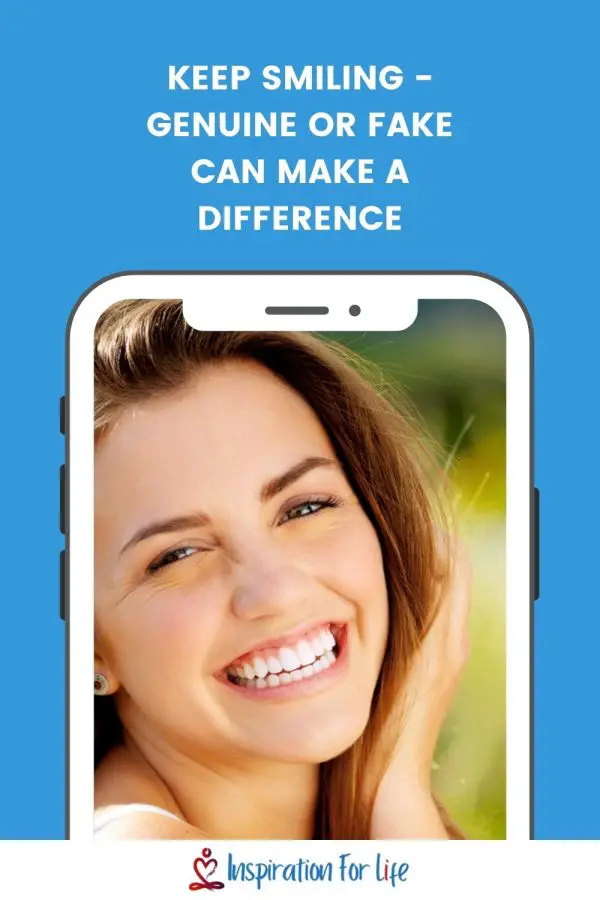We all know those people who tell us to keep smiling. I mean, just look at this list of reasons to keep smiling;
- To look happy
- Show you love life
- To be positive
- A gift from God
- Live in the moment
- Enjoy every day
- It is contagious
- Believe in yourself
Oh My Gosh, just Keep Smiling! Is a smile the answer to everything? Absolutely not! Anyone can fake a smile, but the smile won’t mean a thing unless it is real. Or maybe not; maybe a fake smile is an answer to a bad day.
How can we help you?
Find out more information about our
exclusive private Facebook group.
Can You Smile Too Much?
Well, the answer to this has to be yes! We often try to make others think life is good with a smile plastered on our faces. A fake smile can be beneficial to a positive outlook, but at the same time, it can hide problems that can affect our well-being.
If someone thinks you’re trying too hard for their approval, they might start thinking less of you. When you smile continuously, it doesn’t mean you are happy. So, smiling can be a cover for deeper emotions.
What a Smile Means In Different Cultures
Many people don’t realize they’re making certain facial gestures or body movements that others may misinterpret. If you’re not careful, even a well-timed smile could ruin any chance at building successful friendships.
Smiling has different meanings for people from other countries. For instance, in Russia, smiling doesn’t imply anything good; instead, it means that you’re either stupid or cunning.
Smiling is an integral part of Japanese culture. It shows respect for others and hides what one really feels.
In the US, we smile in order to be friendly towards others, to express our feelings of happiness gratitude, and sometimes even when we’re nervous too.
Smiles Can Hide True Emotions In Any Country
Smiling depression is where people are sad and depressed yet smile to hide it. Often they look at others’ lives as happy and genuine.
Sometimes when people experience depression, they often hide their feelings by smiling. They use smiles to pretend to be happy when really they’re not.
Happiness portrayed by social media looks unrealistically happy. People often look at photos of happy people online and think they’re more optimistic than them. Those with depression frequently feel alone and isolated and feel pressured to put on a fake smile and hide the pain.
Many people disguise their symptoms of depression or pain, so others don’t know. So if they admit that their smiles are there because they’re hiding something painful inside them, then their life isn’t quite so good after all. They don’t want to show who they really are.
Not to mention they don’t want to show or share their pain with the world, so they put on a smile.
Set Aside Depression And Culture
Let’s say you are not depressed and you are from a culture like the US. How can a smile help you? Well, it depends on the interpretation of it or how others perceive it. Is your smile genuine, or are you putting a smile on your face to look good?
Either way, a smile can change the chemical makeup of the brain.
Smiling actually stimulates our brains’ reward mechanisms better than eating chocolate ever could! So even a fake smile can have benefits.
Smiling is associated with happiness and peace of mind. According to Mother Theresa, “Peace begins with a smile.” It’s good for relationships because smiling makes people appear friendly and approachable.
The Duchenne Smile
A genuine smile is different from a fake smile in appearance.
Guillaume Duchenne was an 18th-century French physician who made important scientific discoveries regarding muscle anatomy. His most notable contribution centers on his study of facial expressions. Therein lies the Duchenne Smile.
A Duchenne smile is an expression that signifies genuine happiness. When smiling, the muscle, zygomaticus major, pull up the corner of your lips, which causes wrinkles near your eye sockets.
People can tell if you have a genuine smile or a fake smile by the evidence of the wrinkles at the corner of your eyes.
What A Fake Smile Can Do – Just Keep Smiling
So a genuine natural smile can change your chemistry, but what about a fake smile? Will it cause the same changes?
A study published recently in an academic journal has shown that people who smiled were happier than those who didn’t. When triggered, certain facial muscles can trick your brain into believing you’re actually feeling happiness. Therefore even a fake smile can fool the brain into thinking one feels happy.
A new study from Psychological Sciences reveals;
When people smile briefly under stressful conditions, their bodies respond less intensely than they would if they were not smiling at all.
Some research has shown that smiling even when you don’t feel happy can help improve your mood and increase your overall happiness levels.
Conclusion

Smiles mean different things in varying cultures. But here in the US, a smile is a friendly gesture.
Some hide their depression behind a smile and may need help. To use a fake smile when you are depressed may be detrimental to your emotional health. With this in mind, if you’re experiencing symptoms of depression or anxiety, you should speak with your doctor right away so they can help you figure out which medication works best for you.
But if you are having a tough day or a situation that is causing you stress, a smile can change the chemistry of your brain. A genuine smile that lights up your eyes or a fake smile will cause the same changes.
When you plaster a smile on your face, neurotransmitters like Dopamine, Serotonin, and Endorphins come into play. Endorphins relieve pain, whereas serotonin reduces depression. Therefore a real or a fake smile can change your day.
So keep smiling and change the muscles of your face along with your brain chemistry to improve your day.


